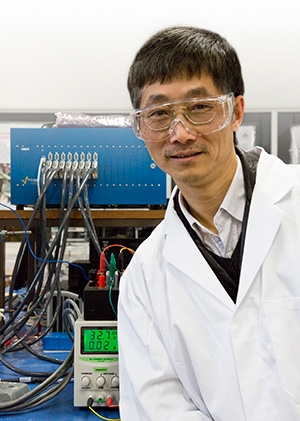Arresting the corrosion factor
Research news
With many gas and oil pipelines nearing the end of their lifespans - and plans for thousands of kilometres of new pipelines across Australia - the timing is right for the establishment of Deakin’s Corrosion Research Centre at Waurn Ponds.
The Deakin Corrosion Research Centre (DCRC) is a centre for research in corrosion science and engineering, with particular focus on the durability, reliability and protection of critical infrastructure, such as oil and gas pipelines, water, waste water and desalination infrastructures.
Positioning Deakin at the hub of corrosion research in Australia, the Corrosion Research Centre aims to use the latest technology to help add decades to the existing billion dollar pipeline infrastructure - both in Australia and overseas. It will also contribute the know-how for much more durable and longer-lived new high pressure piping. Supported by the Energy Pipeline Co-operative Research Centre, this aspect of its research explores the use of innovative corrosion sensors, advanced cathodic protection and surface coating technologies.
Other industries set to benefit from DCRC research include the mining and power industries, defence and aerospace.
The Director of Deakin Research Commercial, Gary Heyden, said that the new lab and its services are unique in Australia - and open to industry and researchers alike. “We can assist industry to gain knowledge about corrosion that hasn’t been available in Australia before,” he said.
Mr Heyden explained that the Centre has been set up in response to industry need and “is essential for building up a capability for pipeline coating selection, research and development.”
“In particular, the Australian Pipeline Industry Association, which has around 500 members and represents Australia’s 50 major pipeline and related companies, has played a key role in its establishment,” he said.
“The Centre also performs commercial, independent coating tests for coating manufacturers, suppliers, applicators and end users in Australia and overseas.”
DCRC’s research and teaching programs are based upon Deakin’s existing national and international reputation in metallurgy and materials research within its Institute for Frontier Materials and School of Engineering.
DCRC Co-Director, Professor Mike Tan, explained that safety is paramount in this industry.
“Cracking and other problems in pipelines can have catastrophic consequences,” he said. “For instance, last November around 70 people were killed in China when a gas line exploded.”
“Many companies are trying to extend the life of pipelines from the original 30 years to 100 years and they are calling on us to help them do this.”
Professor Tan is optimistic that rapid developments in technology will go a long way to making this ambition achievable.
“Rather than replacing all the pipes, we can use sensors to predict the life of specific sections of pipeline and then develop maintenance plans to manage them,” he said.
“One of the high tech sensing methods that we have developed is to monitor the performance of pipeline coating and cathodic protection systems.”
He added that major investment in new pipelines is currently occurring within Australia - and the Centre will be able to contribute to improved durability of the new piping.
“There are more than 33,000 kilometres of high-pressure steel pipelines in Australia, of which more than 25,000 kilometres are used for natural gas transmission,” he explained.
Natural gas provides around 20 per cent of Australia’s energy requirements, but this figure is expected to double over the next two decades, with around 10,000 kilometres of additional piping either proposed or currently being constructed in Australia.
“Until now, many companies had to go to the USA for this type of quality research. Our investment in state-of-the-art equipment means that we can now provide this research in Australia,” Professor Tan said.
He added that a key feature of the Centre is its location within Deakin University, which provides the “critical mass” of intellectual capital and sophisticated technology that enables the comprehensive independent testing required to meet Australian safety standards.
Corrosion research at Deakin University is supported by various state-of-the-art testing and characterisation facilities, including the national facility for pipeline coating assessment and various other materials and electrochemical testing facilities.
Surface characterisation equipment, including scanning electron microscopes, Optical Profilometry and ATR-FTIR spectroscopy, are available in Research Centres within Deakin’s Institute for Frontier Materials. Advanced electrochemical facilities include multi-channel potentiostats, scanning electrochemical microscopy, electrochemical impedance and electrochemical noise instruments, and a multi-electrode array system (WBE instrument). There are also general corrosion testing facilities, such as autoclaves and pressure vessels.
The Corrosion Research Centre supports over 20 researchers from Deakin’s School of Engineering and Institute for Frontier Materials. It incorporates the National Pipeline Coating Facility and the Energy Pipelines Co-operative Research Centre (CRC) and is overseen by Co-Directors, Professor Mike Tan, who manages the pipeline arm, and Professor Maria Forsyth, who oversees electrolyte and charge transport research at the Centre’s Burwood facilities.
Share this story
 Professor Mike Tan
Professor Mike Tan
